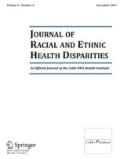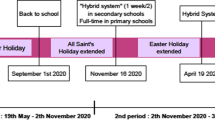Abstract
Based on the Head Start Impact Study, 1706 parents who had mild, moderate, and severe depressive symptoms were selected to examine the following questions: (1) Are there racial disparities in mental health service utilization among low-income parents? (2) Does Head Start have an impact on mental health service utilization across white, African American, and Hispanic parents? The present research found that, compared to white parents, African American and Hispanic parents are significantly less likely to utilize mental health services. Head Start impact was found for white parents but not for African American and Hispanic parents. Furthermore, parents who spoke a language other than English had higher household risk factors, and reside in rural areas are less likely to utilize mental health services. Mental health providers should deliver patient-centered services that consider cultural and linguistic competency as well as the personal life context of their patients to remove any barriers to accessing mental health services.

Similar content being viewed by others
References
Aikens N, Nikki L, Klein AK, West J, Tarullo L. Head Start children's developmental progress and kindergarten experiences. In: Research brief. OPRE Report 2017-71: Office of Planning, Research and Evaluation; 2017.
Alang SM. Sociodemographic disparities associated with perceived causes of unmet need for mental health care. Psychiatr Rehabil J. 2015;38(4):293–9.
Alhusen JL, Hayat MJ, Borg L. A pilot study of a group-based perinatal depression intervention on reducing depressive symptoms and improving maternal-fetal attachment and maternal sensitivity. Arch Womens Ment Health. 2021;24:145–54.
American Psychiatric Association. (2017). Mental health disparities: diverse populations. https://www.psychiatry.org/File%20Library/Psychiatrists/Cultural-Competency/Mental-Health-Disparities/Mental-Health-Facts-for-Diverse-Populations.pdf
Baker CE. Maternal depression and the development of executive function and behavior problems in Head Start: indirect effects through parenting. Infant Ment Health J. 2018;39(2):134–44.
Barksdale CL, Kenyon J, Graves DL, Jacobs CG. Addressing disparities in mental health agencies: strategies to implement the national class standards in mental health. Psychol Serv. 2014;11(4):369–76.
Barrera AZ, Morris SY, Ruiz A. Mothers and babies online course: participant characteristics and behaviors in a web-based prevention of postpartum depression intervention. Frontiers in Global Women's Health. 2022;3:1–8.
Barrera AZ, Aguilera A, Inlow N, Servin J. A preliminary study on the acceptability of a brief SMS program for perinatal women. Health Informatics J. 2020;26(2):1079–87.
Beeber LS, Holditch-Davis D, Perreira K, Schwartz T, Lewis V, Blanchard H, Canuso R, Goldman BD. Short-term in-home intervention reduces depressive symptoms in Early Head Start Latina mothers of infants and toddlers. Res Nurs Health. 2010;33(1):60–76.
Cai A, Robst J. The relationship between race/ethnicity and the perceived experience of mental health care. Am J Orthopsychiatry. 2016;86(5):508.
Cassidy J, Brett BE, Gross JT, Stern JA, Martin DR, Mohr JJ, Woodhouse SS. Circle of security–parenting: a randomized controlled trial in Head Start. Dev Psychopathol. 2017;29(2):651–73.
Chazan-Cohen R, Ayoub C, Pan BA, Roggman L, Raikes H, McKelvey L, Whiteside‐Mansell L, Hart A. It takes time: impacts of Early Head Start that lead to reductions in maternal depression two years later. Infant Ment Health J. 2007;28(2):151–70.
Chor E. Multigenerational Head Start participation: an unexpected marker of progress. Child Dev. 2018;89(1):264–79.
Delphin-Rittmon ME, Flanagan EH, Andres-Hyman R, Ortiz J, Amer MM, Davidson L. Racial-ethnic differences in access, diagnosis, and outcomes in public-sector inpatient mental health treatment. Psychol Serv. 2015;12(2):158–66.
Diaz-Linhart Y, Silverstein M, Grote N, Cadena L, Feinberg E, Ruth BJ, Cabral H. Patient navigation for mothers with depression who have children in head start: a pilot study. Soc Work Public Health. 2016;31(6):504–10.
DuPont-Reyes MJ, Villatoro AP, Phelan JC, Painter K, Link BG. Adolescent views of mental illness stigma: an intersectional lens. Am J Orthopsychiatry. 2020;90(2):201–11.
Farber EW, Ali MK, Van Sickle KS, Kaslow NJ. Psychology in patient-centered medical homes: reducing health disparities and promoting health equity. Am Psychol. 2017;72(1):28–41.
Galvan T, Gudiño OG. Understanding Latinx youth mental health disparities by problem type: the role of caregiver culture. Psychol Serv. 2021;18(1):116.
Garverich S, Prener CG, Guyer ME, Lincoln AK. What matters: factors impacting the recovery process among outpatient mental health service users. Psychiatr Rehabil J. 2021;44(1):1–10.
Ghafoori B, Fisher DG, Koresteleva O, Hong M. Factors associated with mental health service use in urban, impoverished, trauma-exposed adults. Psychol Serv. 2014;11(4):451.
Hall GCN, Berkman ET, Zane NW, Leong FT, Hwang WC, Nezu AM, Hong JJ, Chu JP, Huang ER. Reducing mental health disparities by increasing the personal relevance of interventions. Am Psychol. 2020;76(1):1–13.
Hanach N, de Vries N, Radwan H, Bissani N. The effectiveness of telemedicine interventions, delivered exclusively during the postnatal period, on postpartum depression in mothers without history or existing mental disorders: a systematic review and meta-analysis. Midwifery. 2021;94:102906.
Head Start Early Childhood Learning and Knowledge Center. (2021). Family connections: a mental health consultation model. https://eclkc.ohs.acf.hhs.gov/mental-health/article/family-connections-mental-health-consultation-model
Jones AL, Cochran SD, Leibowitz A, Wells KB, Kominski G, Mays VM. Usual primary care provider characteristics of a patient-centered medical home and mental health service use. J Gen Intern Med. 2015;30(12):1828–36.
Manuel JI, Martinson ML, Bledsoe-Mansori SE, Bellamy JL. The influence of stress and social support on depressive symptoms in mothers with young children. Soc Sci Med. 2012;75(11):2013–20.
McCoy DC, Morris PA, Connors MC, Gomez CJ, Yoshikawa H. Differential effectiveness of Head Start in urban and rural communities. J Appl Dev Psychol. 2016;43(2016):29–42.
Mennen FE, Molina AP, Monro WL, Duan L, Stuart S, Sosna T. Effectiveness of an interpersonal psychotherapy (IPT) group depression treatment for head start mothers: a cluster randomized controlled trial. J Affect Disord. 2021;280:39–48.
Miller EB, Farkas G, Duncan GJ. Does Head Start differentially benefit children with risks targeted by the program's service model? Early Child Res Q. 2016;34(2016):1–12.
Mulder R, Rucklidge J, Wilkinson S. Why has increased provision of psychiatric treatment not reduced the prevalence of mental disorder. Aust N Z J Psychiatry. 2017;51:1176–7.
National Institute of Mental Health (2018). Mental health information. Retrieved from https://www.nimh.nih.gov/health/statistics
Owora AH, Carabin H, Reese J, Garwe T. Diagnostic performance of major depression disorder case-finding instruments used among mothers of young children in the United States: a systematic review. J Affect Disord. 2016;201:185–93.
Rodriguez-Seijas C, Eaton NR, Pachankis JE. Prevalence of psychiatric disorders at the intersection of race and sexual orientation: results from the National Epidemiologic Survey of Alcohol and Related Conditions-III. J Consult Clin Psychol. 2019;87(4):321–31.
Silverstein M, Diaz-Linhart Y, Grote N, Cadena L, Cabral H, Feinberg E. Harnessing the capacity of Head Start to engage mothers with depression in treatment. J Health Care Poor Underserved. 2017;28(1):14–23.
Sklar M, Aarons GA, O’Connell M, Davidson L, Groessl EJ. Mental health recovery in the patient-centered medical home. Am J Public Health. 2015;105(9):1926–34.
Tandon SD, Leis JA, Mendelson T, Perry DF, Kemp K. Six-month outcomes from a randomized controlled trial to prevent perinatal depression in low-income home visiting clients. Matern Child Health J. 2014;18:873–81.
U.S. Department of Health and Human Services. Administration for Children and Families. (USDHHS) (2010). Head Start impact study. Final report. Retrieved from https://www.acf.hhs.gov/sites/default/files/opre/hs_impact_study_final.pdf
U.S. Department of Health and Human Services. Administration for Children and Families. (US DHHS) (2010). Head Start impact study. Techinical report. Retrieved from https://www.acf.hhs.gov/opre/resource/head-start-impact-study-technical-report
U.S. Department of Health & Human Services. (2019). Head Start: early childhood learning & knowledge center. Head Start Program Facts Fiscal Year 2019. Retrieved from https://eclkc.ohs.acf.hhs.gov/sites/default/files/pdf/no-search/hs-program-fact-sheet-2019.pdf.
U.S. Department of Health & Human Services. (2018). Head Start: Early Childhood Learning & Knowledge Center. Office of Head Start - Services Snapshot: National All Programs (2017-2018). Retrieved from https://eclkc.ohs.acf.hhs.gov/sites/default/files/pdf/no-search/service-snapshot-all-progrms-2017-2018.pdf.
U.S. Department of Health and Human Services. (n.d.). Head Start: early childhood learning & knowledge center. Retrieved from https://eclkc.ohs.acf.hhs.gov/policy/45-cfr-chap-xiii/1302-subpart-e-family-community-engagement-program-services.
Valentine A, DeAngelo D, Alegría M, Cook BL. Translating disparities research to policy: a qualitative study of state mental health policymakers’ perceptions of mental health care disparities report cards. Psychol Serv. 2014;11(4):377–87.
Villatoro AP, Dixon E, Mays VM. Faith-based organizations and the Affordable Care Act: reducing Latino mental health care disparities. Psychol Serv. 2016;13(1):92–104.
Villatoro AP, Morales ES, Mays VM. Family culture in mental health help-seeking and utilization in a nationally representative sample of Latinos in the United States: the NLAAS. Am J Orthopsychiatry. 2014;84(4):353–63.
Williams DR, Priest N, Anderson NB. Understanding associations among race, socioeconomic status, and health: patterns and prospects. Health Psychol. 2016;35(4):407–11.
WHO Commission on Social Determinants of Health, & World Health Organization. Closing the gap in a generation: health equity through action on the social determinants of health: Commission on Social Determinants of Health final report: World Health Organization; 2008.
Young AS, Rabiner D. Racial/ethnic differences in parent-reported barriers to accessing children’s health services. Psychol Serv. 2015;12(3):267–73.
Author information
Authors and Affiliations
Corresponding author
Additional information
Publisher’s Note
Springer Nature remains neutral with regard to jurisdictional claims in published maps and institutional affiliations.
Rights and permissions
Springer Nature or its licensor (e.g. a society or other partner) holds exclusive rights to this article under a publishing agreement with the author(s) or other rightsholder(s); author self-archiving of the accepted manuscript version of this article is solely governed by the terms of such publishing agreement and applicable law.
About this article
Cite this article
Lee, K., Hough, K. Racial Disparity of Mental Health Service Utilization Among Low-Income Head Start Eligible Parents. J. Racial and Ethnic Health Disparities 11, 611–620 (2024). https://doi.org/10.1007/s40615-023-01545-1
Received:
Revised:
Accepted:
Published:
Issue Date:
DOI: https://doi.org/10.1007/s40615-023-01545-1



